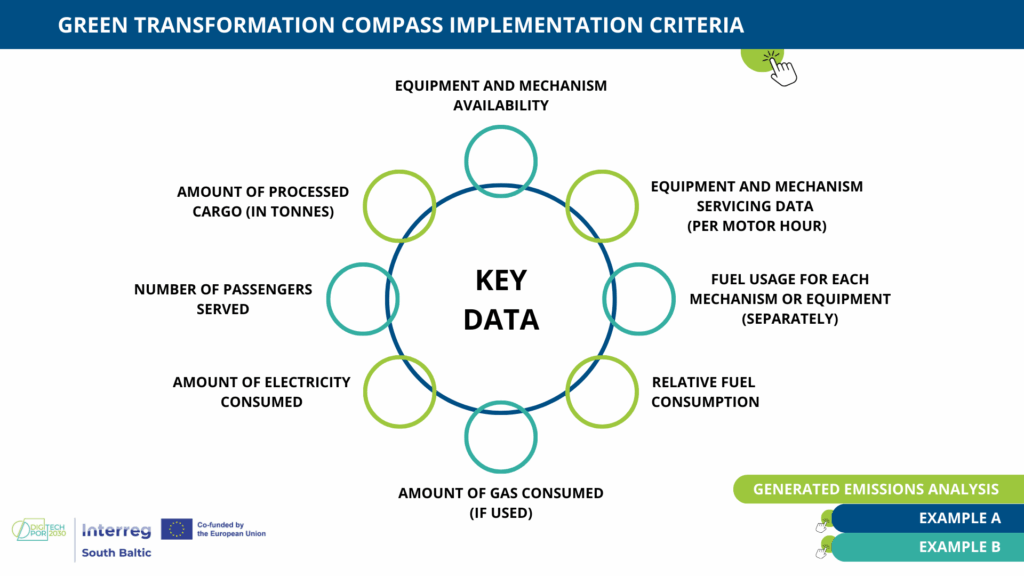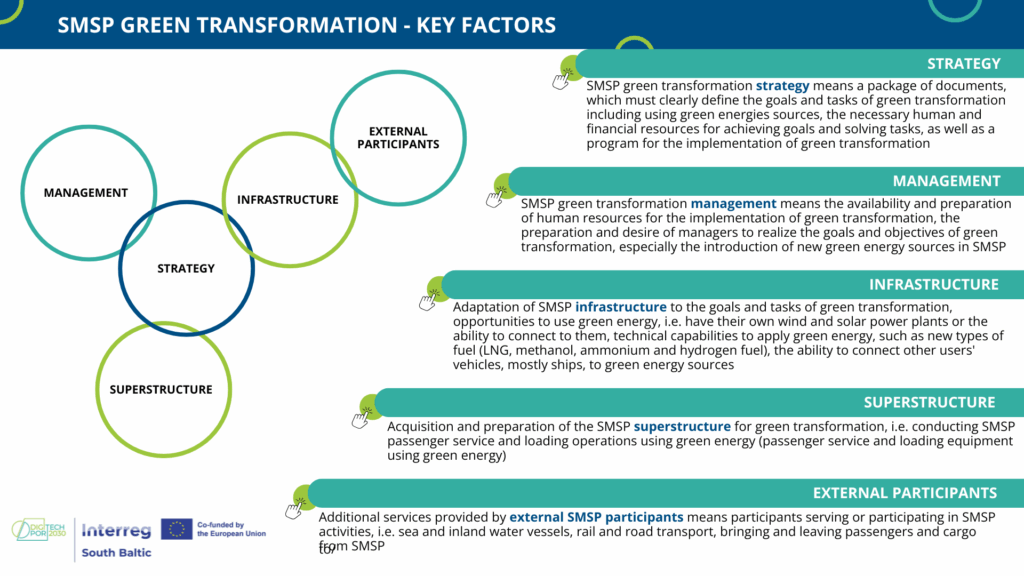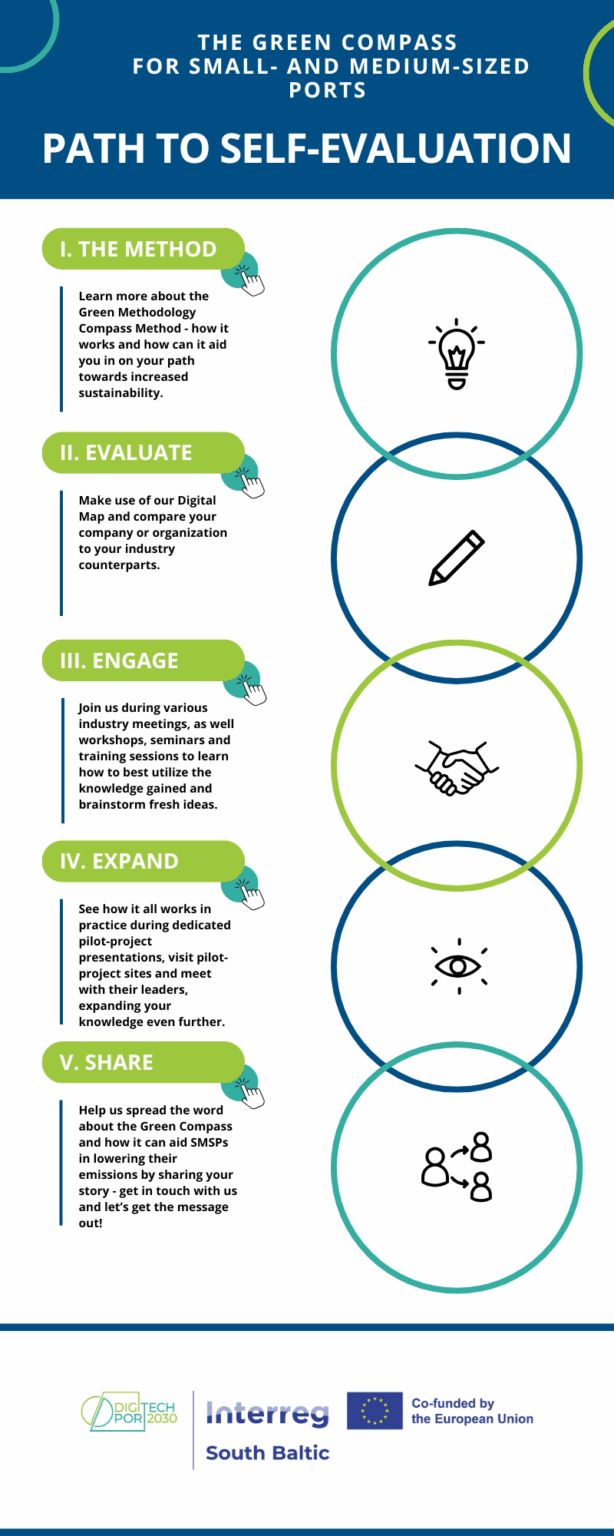RESULTS
Green Energy Technology Compass
DiGiTechPort2030 – Compiling the Green Energy Technology Compass for Small and Medium-Sized Ports (SMSPs)
(Work Package 2: Preparingsmall for Green Energy Transition in SMSPs Ecosystems)
General overview
The Green Compass is a digital platform and strategic tool developed by Klaipėda Science and Technology Park (KSTP) as part of the DigiTechPort2030 initiative. It is designed to support small- and medium-sized ports (SMSPs), particularly in the South Baltic Sea Region, in making a structured and effective transition toward green energy and sustainability.
Considering growing regulatory demands – such as the EU Green Deal and IMO’s Fit for 55 – as well as increasing pressure to reduce emissions, SMSPs face significant challenges. Unlike larger ports, they often lack the financial capacity, technical expertise, and institutional support needed to implement green solutions. Nevertheless, their operations remain under the same environmental requirements. The Green Compass addresses this gap by offering a practical, resource-efficient pathway tailored to SMSP realities.
The tool provides a structured methodology to assess a port’s current energy and emission status, define realistic goals, and plan step-by-step improvements across strategic, managerial, and operational levels. It enables SMSPs to:
• Identify the most effective actions to reduce emissions and improve energy efficiency;
• Prioritize investments in infrastructure, technologies, and management practices;
• Track progress over time through measurable indicators;
• Benchmark performance against other ports and regulatory targets;
• Evaluate their current environmental impact, including emissions per tonne of cargo or per passenger served.
Beyond technical functionality, the Green Compass helps ports improve their strategic positioning in a changing market where environmental performance is increasingly tied to competitiveness, client expectations, and funding eligibility. By using the Compass, SMSPs can make informed decisions that balance ambition with available resources – turning sustainability from a challenge into a clear strategic advantage.

Methodology
The methodology, based on general principles of environmental assessment and smart port development, encompasses a number of key characteristics:
• Data Collection & Harmonization: Gathering diverse data points from various port operations, including energy consumption (electricity, fuel), types of equipment, vessel traffic, cargo throughput, waste generation, water usage, and existing infrastructure. This data would need to be harmonized to a common standard for comparison and analysis.
• Emission Factor Application: Applying standardized emission factors (e.g., from IPCC, national agencies, or industry bodies) to energy consumption and activity data to calculate greenhouse gas (GHG) and pollutant emissions (e.g., CO2, NOx, SOx, PM).
• Baseline Establishment: Defining a baseline period (e.g., a specific year) against which all future environmental performance improvements are measured.
• Normalization: Normalizing data against operational metrics (e.g., emissions per tonne of cargo handled, per vessel call, per square meter of port area) to allow for fair comparisons over time and between different ports.
• Thresholding and Anomaly Detection: Implementing thresholds to identify high-emission areas or periods of abnormal energy consumption. This helps in pinpointing inefficiencies or equipment malfunctions.
• Categorization and Classification: Classifying energy sources, equipment types, and emission sources into predefined categories (e.g., shore-side power, vessel emissions, cargo handling equipment emissions) for structured analysis.
• Scenario Modelling: Potentially allowing for the modelling of different green technology adoption scenarios to project future energy consumption and emission reductions, helping ports make informed investment decisions.
• Performance Indicators (KPIs): Defining and tracking key performance indicators (KPIs) related to energy efficiency, renewable energy penetration, and emission reductions.
• Data Visualization: Presenting filtered and analysed data through dashboards, charts, and graphs for clear and intuitive understanding, enabling port authorities to visualize their environmental footprint and progress.
• Compliance Check: Filtering data against regulatory limits and targets to identify areas of non-compliance or where significant effort is needed to meet future regulations.

How does it work?
Building on the strategic context outlined above, the following section provides a practical breakdown of how SMSPs can use the Green Compass to structure their transition efforts. While the document does not present a rigid, step-by-step user manual, it outlines a clear methodology that ports can apply and adapt to their individual needs and contexts:
1. Initial Assessment and Baseline Establishment:
- Data Collection: Ports would input data related to their current energy consumption, types of energy sources used, emissions generated (e.g., from vessels, handling equipment, vehicles, buildings), and existing green initiatives.
- Self-Assessment: The Green Compass guides the port through a self-assessment to evaluate its current sustainability performance and identify its “green transformation stage.” This includes identifying primary emissions and areas for improvement across various operational and infrastructural aspects.
2. Gap Analysis and Opportunity Identification:
- Based on the assessment, the tool helps pinpoint specific areas where the port deviates from green standards or where significant energy savings/emission reductions can be achieved.
- It identifies potential renewable energy sources applicable to the port’s unique context (e.g., available space for solar panels, wind potential, feasibility of shore power).
3. Prioritization of Actions:
- The Green Compass assists in prioritizing interventions based on their potential impact (emission reduction, energy efficiency), cost-effectiveness, technological readiness, and alignment with regulatory requirements. This includes evaluating options like electrification of equipment, adoption of alternative fuels, smart energy management systems, or integration of on-site renewable energy generation.
4. Development of a Strategic Roadmap:
- The tool helps formulate a tailored strategic roadmap for the port’s green transformation. This roadmap would outline specific actions, timelines, responsible parties, and expected outcomes.
- It supports the development of both short-term “micro-actions” and long-term strategic plans.
5. Implementation and Monitoring:
- As the port implements the planned actions, the Green Compass facilitates continuous monitoring and tracking of progress. This includes measuring reductions in emissions, improvements in energy efficiency, and overall environmental performance.
- The tool supports periodic self-assessment to adjust the roadmap as needed and ensure continuous improvement.
6. Knowledge Transfer and Collaboration:
- Implicit in the project’s goals is the idea that the Green Compass serves as a platform for knowledge exchange, best practices, and cross-border cooperation among SMSPs, helping them learn from each other’s experiences.
Conclusion
The Green Compass represents a practical and strategic response to the challenges SMSPs face in aligning with global and European climate objectives. By offering a structured, scalable, and resource-conscious framework, the tool empowers ports to take ownership of their green transformation – regardless of size, current capacity, or stage of readiness.
Through self-assessment, data-driven planning, and performance tracking, SMSPs can gain a clear understanding of their environmental impact and prioritize the most effective actions to reduce emissions and improve energy efficiency. The methodology ensures that decisions are based on measurable outcomes, enhancing transparency and long-term sustainability.
Importantly, the Green Compass is not just a diagnostic tool – it is a decision-making support system. It helps ports focus limited resources where they can have the greatest effect, avoid costly inefficiencies, and prepare for increasing regulatory and market expectations. In doing so, it strengthens each port’s strategic positioning within a more competitive, sustainability-driven maritime sector.
Ultimately, the Green Compass enables SMSPs to move from compliance to proactive leadership in the green transition. By applying the framework presented in this document, ports can confidently take their next steps toward climate neutrality – contributing not only to environmental goals but also to their own operational resilience and long-term value creation.
You are kindly invited to evaluate your organisation’s position in the Green Transition using the Green Compass Methodology. Join other Small and Medium-Sized Ports in the South Baltic Area who are committed to change and actively seeking opportunities for sustainable development.
The link to the methodology can be found here or by scanning the QR code on the right.

